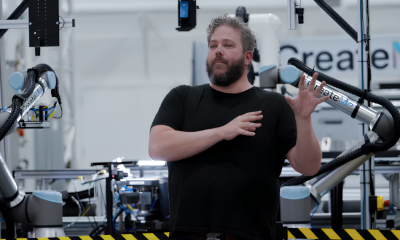Interviews
Sanchit Mullick, Assoc. Vice President for AI & Automation at Infosys – Interview Series

Sanchit Mullick is associate vice president and global head of Sales for AI and Automation Services at Infosys. In this role, he leads worldwide sales, marketing and alliances for AI and Automation Services and partners with customers to help them chart their roadmap across the Automation spectrum, leveraging everything from robotic automation to cognitive services. Mullick has worked across the U.S., Australia, the UK and India, having played roles spanning sales, consulting and deliver
Infosys enables enterprise companies to integrate robotic process automation (RPA). What are some of the reasons why companies should consider these options?
RPA enables businesses to unlock operational efficiencies in the form of capacity release, cost avoidance through flattening the work curve, higher quality through repeated robotic actions, improved employee experience through removal of mundane, boring tasks, and improved customer experience through consistent behavior and better average handling time.
In the early stages of adoption, RPA can play a pivotal role in uplifting organization productivity. However, as adoption spreads across the enterprise and with low code / no code platforms driving citizen development in some enterprises, we see RPA as an effective tool to uplift individual productivity.
What are some examples of RPA tasks Infosys can assist with?
Infosys can assist any business across any industry that has repeatable, rule-based routine tasks being performed by humans. Most RPA adoption programs start in enterprise functions such as Finance, Accounting, HR, Procurement amongst others. This is because these functions lend themselves to cross-industry portability of use cases and automation ideas. Increasingly, however, there are instances of RPA being used to drive efficiency and effectiveness in core business processes. For example, we are working with a large banking client of ours to reimagine their Treasury operations using automation and AI.
An early limitation of RPA platforms was that they could only work off structured data as the input. However, most RPA platforms have now evolved to the point where they are able to apply techniques to first convert semi- or unstructured data into structured data thus increasing the pipeline of opportunities for automation, and in doing so transitioning into Intelligent Process Automation.
Does Infosys also offer AI Automation training?
We have developed an always-on learning approach and have democratized learning through our internal training platform, Lex. We have created learning paths with different levels of certification that allow our employees to become “Automation Professionals” or “AI Professionals” or both. The content for these learning paths has been put together with inputs from our software product partners, as well as our academic partnerships.
We offer these training programs and extend this learning value chain to our clients as they seek to reskill / upskill their employees. We have also created micro capsules around specific RPA platforms which can be leveraged to drive quick enablement amongst business users, which in turn can facilitate effective ideation. This is extremely important in the automation and AI domain, because the first step to driving success in automation adoption is to identify the best use cases and in most cases (dare I say all) this comes through effective participation from business.
Infosys offers a ‘Technology Rethink,’ so that the fundamental changes that are needed in the application landscape and infrastructure can be assessed. Could you walk us through an example of how this would be applied?
Think of how the process is being done, how the process will change over time, and the way the process interacts with other units within the organization: these are the considerations we take before starting an RPA project. To rethink how we use technology ultimately helps us rethink how we do work. At Infosys, we strive to bring this philosophy with us every day, and apply it to how we collaborate with our clients. With the democratization of AI and RPA, organizations have the opportunity to take leaps and bounds with the frameworks we’ve developed to undertake their digital transformation initiatives.
A vast majority of traditional organizations are sitting on applications and infrastructure assets that are dated. Legacy Modernization is one of Infosys’ core offerings to help our clients renew and refresh their offerings to the market. Purely from an AI & Automation stand point, our process discovery approaches encourage business teams to rethink how they should refresh their business processes according to changing market dynamics. For example, our AI driven IT Operations approach brings deep insights from the application and infrastructure through analysis of service tickets, alerts and exceptions to help develop AI driven humanless service desks, self-heal and preventative maintenance approaches to reduce the manual effort across client’s IT operations.
Infosys enables the creation of a smart workforce with the Infosys conversational AI solution. Could you share with us some details regarding the natural language processing that is used by this chatbot, and why it is superior to competing solutions?
Our internally developed NIA chatbot solution was designed to help all business units within Infosys apply conversational AI into their departments, and with this experience we are now able to service our clients using the same solution. A few features such as our FAQ extractor, utterance creator, and easy-to-use admin panel help with fast chatbot deployment.
Additionally, our ability to integrate with communication platforms such as Facebook, Skype and WhatsApp allows our clients to interface with their customers and vendors in a unified way. Adding RPA with Conversational AI allows for action bots to complete tasks and common requests. Active learning can be applied to chatbots to allow for bots to get smarter over time with human intervention. We leverage open source NLP algorithms as well as proprietary offerings from Google, Azure, AWS and Watson that we have integrated into the Nia chatbot. This allows us to continually improve based on the progress made in the industry and also leverage any investments already made by our clients.
Is a decision tree always used with this chatbot, or is this on a case-by-case basis?
The decision tree is a fundamental component to help chatbots understand the workflow requests with the users it interacts with. Other techniques can be used to enhance the accuracy and user interaction of the bot.
What are some interesting new products or solutions that Infosys is working on?
Bot Factory, which is a repository of prebuilt ‘micro bots’ that allows users to stitch together prebuilt automations for rapid RPA deployment.
Then there’s MiniChat, which has been developed based on NLP algorithms for quick and correct response to the user. The solution needs a fixed set of FAQs to perform initial training and generating training data as it uses utterances given in training data for answering user queries. It reduces human effort to find a solution for frequently occurring problems / issues. MiniChat can be deployed on any webpage within a time span of 2-3 hours.
Finally, email work bench. Organizations across the globe deal with a myriad of unstructured emails from clients be it for buying a product, requesting a change in their details, or complaints and feedback. Infosys has developed an NLP-driven model-based solution to help extract usable information and automate an action based on the trigger.
These are only some examples of solutions that we constantly develop as part of every project that we execute and then make available to our clients worldwide to drive improved delivery.
Is there anything else that you would like to share about Infosys?
There has been an enormous amount of coverage around automation and AI. In all of this, it is important to remain focused on solving real world problems. And Infosys is addressing this by focusing on both problem finding and problem solving. We are driving this by creating an ecosystem that brings together consulting, technology and operations. Also by treating the entire spectrum of tools as a continuum. From the very beginning we have housed automation and AI capabilities under a single umbrella, and by doing so we bring various technology interventions together to solve a business problem in the best way possible.
Our work has also been recognized by industry leading analysts. Infosys has been rated as a Leader in IDC’s Intelligent Automation Services MarketScape 2019, in our first ever rating in this space. This rating is based on a comprehensive and rigorous framework evaluating IA players on criteria such as strategy, delivery, marketing and client satisfaction. The study highlights the factors expected to be the most influential for success in the market, both in the short and the long term.
HFS Research recently published a viewpoint on why Enterprise AI implementation initiatives should have a business-first approach where HFS called out Infosys’ well-known consulting capabilities and business outcome-focused approaches, our approach to assuming the role of a trusted advisor while deploying AI into a client’s environment, as well as our ability to maintain an end-to-end journey view with a value-creation paradigm.
To learn more visit Infosys












